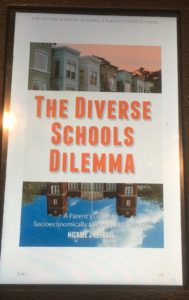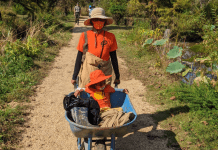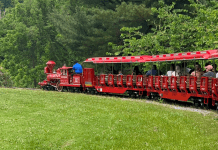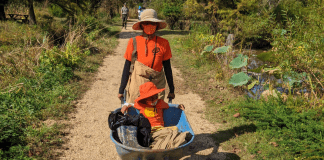 My goal with my son is to replicate the successes of my maternal aunt and uncles with my male cousins. These cousins attended top-ranked state colleges and currently live middle or upper-middle-class lives as Black men with stable careers. When I encounter anything that may help with this goal, it grabs my attention. In my post reviewing the book The Diverse Schools Dilemma I breezed past the topic of African American students, as the book is mainly for white middle and upper-middle-class parents in socioeconomically diverse areas. I vaguely mentioned there was information for middle-class Black students, particularly black boys. I decided to follow up with another post.
My goal with my son is to replicate the successes of my maternal aunt and uncles with my male cousins. These cousins attended top-ranked state colleges and currently live middle or upper-middle-class lives as Black men with stable careers. When I encounter anything that may help with this goal, it grabs my attention. In my post reviewing the book The Diverse Schools Dilemma I breezed past the topic of African American students, as the book is mainly for white middle and upper-middle-class parents in socioeconomically diverse areas. I vaguely mentioned there was information for middle-class Black students, particularly black boys. I decided to follow up with another post.
Challenges for Black Boys
Middle-class Black boys typically do not necessarily face the same problems as lower income Black boys, such as hunger, poor housing, and violence. Academically, the middle-class African American students score higher than their lower-income peers, but there is a gap between them and their white middle-class peers. Diverse Schools Dilemma mentions Nigerian-American anthropologist John Ogbu, and his book Black American Students in an Affluent Suburb: A Study of Academic Disengagement. Ogbu looked into why the gap existed, by conducting a study in the upper-middle-class area of Shaker Heights, OH. Ogbu’s conclusions were that the Black students and their teachers fed off each other’s low expectations, and for teenagers, there was a fear of “acting white.” Diverse Schools Dilemma added to this by pointing to another study about teens and popularity, and for African American teen males, the road the popularity was through sports, not stellar academics. Peer pressure and peer groups were other challenges for the black male student. This left me with the conclusion I would need to curate my son’s peer group.
Tools to Succeed in School
Diverse Schools Dilemma suggested parents to use the website Great Schools to judge if their kids would be okay academically. The idea was to look at test and other scores and pull out the data for white kids. I decided to do the reverse, and look at the data for black students. Sometimes the answer was there, a lot of times, not. So I decided to go to the sources of the data, Office of the State Superintendent of Education (OSSE) and DC Public Schools (DCPS). To my shock, I discovered black students scoring poorly in highly rated elementary schools with impressive PARRC scores. I decided to dig deeper and go to the data source to slice the data even thinner. Looking at test scores for Black boys in DC public and charter schools was just depressing. Yet, there were a few bright spots, and I discovered which DC schools (KIPP, DC Scholars, and DC Prep for 3rd graders) were serving African American male students and providing a space for them to flourish academically.
School Solutions
Diverse Schools Dilemma’s suggestions helped me envision a plan for my son’s education, up until middle school. After elementary school, things get tricky. The book has a suggestion to help middle-class parents of African-American boys overcome the cycle of low expectations, decide excelling academically is a Black thing, and be in a peer group that will push a young man to do and be his best. Unfortunately, the solution is not cheap, it’s a private school. Not just a private school, a private school with a critical mass of students of color. It isn’t the only solution, but a public school program the book highlights is so complex and nuanced I would not trust DCPS or a charter to be able to implement or maintain it. There are a number of predominately African-American private schools in the District of Columbia, but that would be another post for another time.
What books have you read or decisions you have made to ensure your child does well academically?
















Very Interesting Mari. Have you looked into the Friendship Schools? Also, our Montessori (Shining Stars) aims to support minorities as well.
Hi Tatiana. Yes, there is a Friendship charter near us it will be listed among our 12 choices when we join the school lottery next year.
I want to note that I wrote this before the latest 2018-2019 PARCC scores were released this month, and I haven’t really dug into the data yet. My in boundary school seems to have gone from okay, to slightly not great, as far as the scores go. Test scores and school ratings aren’t the only things to judge a school by, but they are the best thing a parent has short of visiting a school and getting a sense of the environment.
When drilling down into the scores I looked specifically at African-American Males and Two-Races Male. There are challenges boys experience (hyper activity, not being able to sit still, etc) in school environments so that is one concern I have. Minority girls might be excelling little superstars (I was), but that doesn’t matter if the boys are lagging behind. A school may believe it is serving non-white kids well, I want to look at evidence, or proof that those aims are met.
The problem black student face is the isolation of being in white spaces if that the majority is not very inclusive to non-whites. As an upper middle class black family, I realized how unwelcoming most spaces are to my kids. Most of the time they are the only non white kids at different activities (soccer, music, dance etc) and that they were a bit isolated because it seems like a lot of white parents are only comfortable interacting with other white parents hence even their small kids gravitate towards the white kids as a result. So now I make it a point to look for classes in neighborhoods with more black kids. I can understand why affluent black kids score badly in elite schools because the spaces are not welcoming to them. Most of america has a segregation problem and DC is not any better despite the diverse communities that live here. The white adults/parents who care… instead of just advocating liberal values on facebook should take a hard look at their lives and how they *unconsciously?* exclude black people from spaces…
Hi Jasmine,
I’m slogging through a book, “Mothering While Black,” by Dawn Marie Dow, a professor at U of Maryland. It’s academic so not exactly a page turner. The advice I would take from what I’ve read so far, to give to you, is to find other middle and upper middle class Black moms/parents to help guide you and find the diverse spaces where you and your kids can thrive. They do exist.
Navigating diversity is a skill. In the Diverse Schools Dilemma, diversity is one of the selling points of private schools with some non-white faces. Many white parents want their kids to develop (or at least have the opportunity) the skill of interacting with people from a different race. Also related to the book DSD I wrote, “Not just a private school, a private school with a critical mass of students of color.” The environment for all parties to develop the skill needs a critical mass.
Yes, all parties, because what I’m talking about is relationships and building social capital and these things can’t be one-sided to be successful and fulfilling. And like any relationship, it can be challenging for everyone involved. Breaking into an already established clique or a group with an invisible bond is challenging for any newcomer, and this town can be hostile and downright unwelcoming to newbies. Breaking through is a skill.
On the topic of academic performance of affluent black kids, there are several things at play. My reason for writing this post was in regard to boys, who face a different challenge than girls. Boys are grappling with race, identity, the desire to be admired/respected, and raging hormones. DSD pointed to studies that say that boys will lean towards sports and the established role of popular black male student, which sadly isn’t an academic. Musician, jock, yes, science whiz, eh.
Lastly, it saddens me that we as a society are coming apart, getting more polarized, getting more lonely. The consequences are fewer welcoming spaces for everyone. I pray with grace and forgiveness we can all work to love our neighbors.
It is such an interesting topic. My neighbor is the CEO of Friendship, so I have followed them for a while. I understand the need of data, but also don’t judge based only on PARCC. For example, Santi is at a Montessori and their scores are not the best, but I see his progress and it’s unbelievable. For me, diversity is key. Not only racial but socio-economic, and we are blessed to have found that at his school.
Always great to read your posts.
I agree with Tatiana – It’s always great to read your posts, Mari! Thank you for highlighting this topic. I appreciate and have been following your thoughts on diversity in education.
Yes, PARCC test scores aren’t the only tool parents have, but there are hundreds of public (DCPS and PCS) schools DC parents have to choose from. Scores are just one metric to help parents winnow down maybe 100+ choices to the manageable 12 for the lottery. There are about 127 DC schools that offer Pre-K 3 & 4. If I narrow that down to wards our travel zones (we live and travel through a few other wards) that knocks the number down to 49. Once we get the number down to 12, the lottery will help determine which school he goes to.
Location, is another major metric, looking at the few reports I could find on what parents look for when offered school choice, as we are so fortunate to have in the District of Columbia, location is a factor. School test scores and rankings are another major factor, but there hasn’t been a lot of press about all the other things that go into a parent’s decision making when making these choices.
Junior is still developing and we haven’t figured out what is his learning style. I don’t know if Montessori is best for him. I find it attractive, but that’s more about me than him. He’s had some early development challenges, and though he’s had many moments of shocking brilliance, he’s had a few moments of frightening regression.
There is another blog post I have in the pipeline about DC Pre-K that should be coming up soon. I mention a few other factors that go into decision making, scores not being one of them because they don’t test pre-schoolers.
Comments are closed.